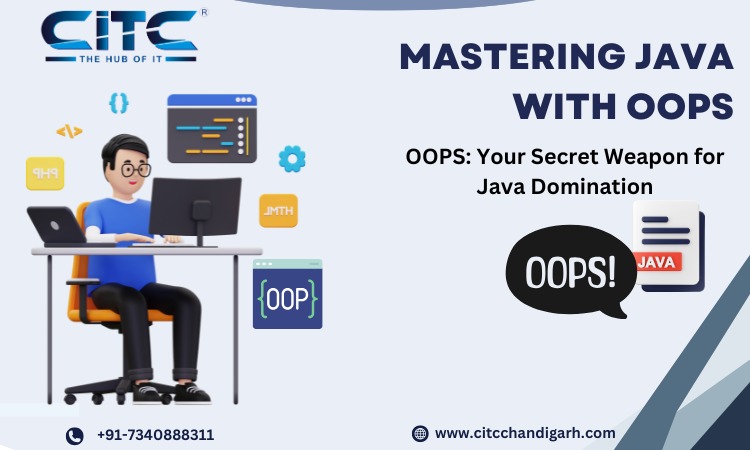Object-Oriented Programming (OOPs) is a foundational concept in Java that enables developers to structure software around objects, making it more flexible, efficient, and reusable. For beginners and experienced coders alike, understanding its principles can be transformative in how you approach coding and problem-solving. Here, CITC – The Hub of IT, explores its basics, its key concepts, and how they integrate into Java.
What is OOPs in Java?
Object-Oriented Programming is a programming pattern that organizes software design around data, or objects, rather than functions and logic. In Java, everything revolves around objects and classes. Instead of focusing only on sequences of instructions, It allows developers to build software by defining the data structure and behavior of objects, which are instances of classes. This approach not only makes code modular but also enhances flexibility and expandability.
The Four Pillars of OOPs in Java:-
Java’s Object-Oriented Programming concepts revolve around four key principles: Encapsulation, Inheritance, Polymorphism, and Abstraction. By understanding these core principles, you can write efficient and well-structured Java programs. Let’s dive into each of these principles in detail.
- Encapsulation : is about bundling the data (attributes) and methods (functions) that operate on the data into a single unit called a class. This encapsulation hides the internal implementation details from the outside world, promoting modularity and security. By using access modifiers like private, protected, and public, you can control access to the data.
Class- A class is a blueprint or template for creating objects. It defines the properties (attributes) and behaviors (methods) of objects.
Object- An object is an instance of a class. It represents a real-world entity with specific properties and behaviors. - Inheritance: Inheritance allows you to create new classes (child classes or subclasses) that inherit the properties and behaviors of existing classes .This reduces redundancy by promoting code reusability. In Java, you use the extends keyword to establish an inheritance relationship. This promotes code reusability and helps in creating a hierarchical structure of classes.
- Polymorphism: Polymorphism allows objects of different types to be treated as if they were of the same type. It enables flexibility and code reusability.
There are two main types of polymorphism:
a)Compile-time polymorphism (Method Overloading): Different methods with the same name but different parameters.
b)Runtime polymorphism (Method Overriding): Subclasses providing specific implementations of methods inherited from the superclass. - Abstraction: Abstraction focuses on the essential features of an object, hiding unnecessary details. It allows you to create abstract classes and interfaces that define the blueprint for other classes. An abstract class can have both defined and undefined methods, while an interface only has abstract methods.
Advantages of OOPs in Java:
1)Modularity:- With encapsulation, code is organized into self-contained classes, making it modular and manageable.
2)Reusability:- Inheritance promotes code reuse, which can significantly reduce development time.
3)Flexibility: Polymorphism makes it easy to modify and extend the code without making major changes to existing code.
4)Security: Abstraction and encapsulation provide better control over data access and manipulation, reducing the risk of unintended interactions.
Thus, Object-Oriented Programming(OOP) in Java is a paradigm that provides structure, reusability, and modularity, making code easier to understand, maintain, and scale. As an object-oriented language, Java brings these OOPs concepts to life through four main principles: encapsulation, inheritance, polymorphism, and abstraction. These principles are foundational to developing robust applications that can handle complex, real-world problems. CITC – The Hub of IT encourages both beginners and professionals to master OOPs in Java for better software design and problem-solving capabilities.
Join Now
Leave a Reply